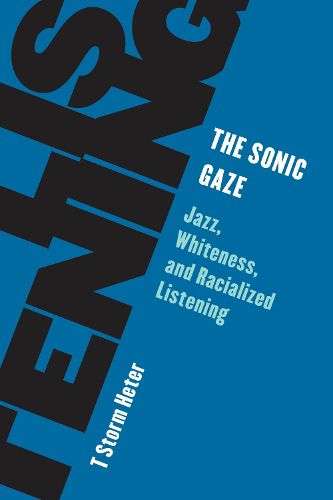Readings Newsletter
Become a Readings Member to make your shopping experience even easier.
Sign in or sign up for free!
You’re not far away from qualifying for FREE standard shipping within Australia
You’ve qualified for FREE standard shipping within Australia
The cart is loading…






A central criticism emerging from Black and Creole thinkers is that mainstream, white dominated, culture, consumes sounds and images of Creole and Black people in music, theater, and the white press, while ignoring critiques of the white consumption of black culture. Ironically, critiques of whiteness are found not only in black literature and media, but also within the blues, jazz, and spirituals that whites listened to, loved, collected, and archived.
This book argues that whiteness is not only a visual orientation; it is a way of hearing. Inspired by formulations of the race and whiteness in the existential writings of Frantz Fanon, Simone de Beauvoir, Jean-Paul Sartre, W.E.B. Du Bois, Richard Wright, Lewis Gordon, Angela Davis, bell hooks and Sara Ahmed, T Storm Heter introduces the notion of the white sonic gaze. Through case studies and musical examples from the history of American jazz, the book builds a phenomenological archive to demonstrate the bad habits of ‘white listening’, drawing from black journalism, the autobiographies of Creole musicians, and the lyrics and sonic content of early jazz music emerging from New Orleans.
Studying white listening orientations on the plantation, in vaudeville minstrel shows, and in cabarets, the book portrays six types of bad faith white listeners, including the white minstrel listener, the white savior listener, white hipster listener, and the white colorblind listener. Connecting critical race studies, music studies, philosophy of race and existentialism, this book is for students to learn how to critique the phenomenology of whiteness and practice decolonial listening.
$9.00 standard shipping within Australia
FREE standard shipping within Australia for orders over $100.00
Express & International shipping calculated at checkout
A central criticism emerging from Black and Creole thinkers is that mainstream, white dominated, culture, consumes sounds and images of Creole and Black people in music, theater, and the white press, while ignoring critiques of the white consumption of black culture. Ironically, critiques of whiteness are found not only in black literature and media, but also within the blues, jazz, and spirituals that whites listened to, loved, collected, and archived.
This book argues that whiteness is not only a visual orientation; it is a way of hearing. Inspired by formulations of the race and whiteness in the existential writings of Frantz Fanon, Simone de Beauvoir, Jean-Paul Sartre, W.E.B. Du Bois, Richard Wright, Lewis Gordon, Angela Davis, bell hooks and Sara Ahmed, T Storm Heter introduces the notion of the white sonic gaze. Through case studies and musical examples from the history of American jazz, the book builds a phenomenological archive to demonstrate the bad habits of ‘white listening’, drawing from black journalism, the autobiographies of Creole musicians, and the lyrics and sonic content of early jazz music emerging from New Orleans.
Studying white listening orientations on the plantation, in vaudeville minstrel shows, and in cabarets, the book portrays six types of bad faith white listeners, including the white minstrel listener, the white savior listener, white hipster listener, and the white colorblind listener. Connecting critical race studies, music studies, philosophy of race and existentialism, this book is for students to learn how to critique the phenomenology of whiteness and practice decolonial listening.